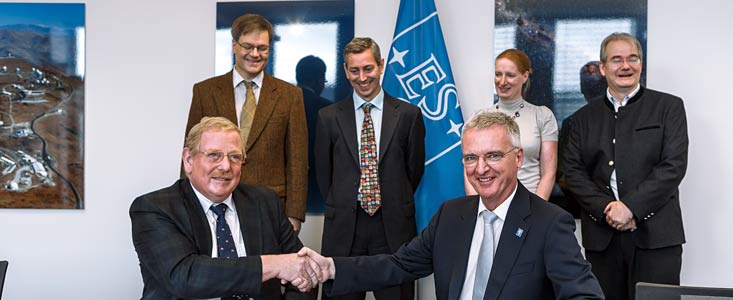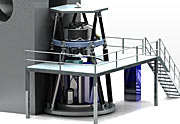Annuncio
Firmato l’accordo per la fotocamera MICADO dell’E-ELT
18 Settembre 2015
L’ESO ha firmato un accordo con un consorzio di istituti europei [1] per la progettazione e la costruzione della fotocamera MICADO (Multi-AO Imaging Camera for Deep Observations), uno degli strumenti di prima luce dell’E-ELT (European Extremely Large Telescope). MICADO sarà la prima fotocamera per l’acquisizione di immagini di questo enorme telescopio e porterà il potenziale delle ottiche adattive a un livello più avanzato.
L’accordo è stato firmato da Reinhard Genzel, Direttore dell’Istituto Max-Planck-Institut für extraterrestrische Physik, in veste di rappresentante del consorzio, e Tim de Zeeuw, Direttore Generale dell’ESO, durante una cerimonia che si è tenuta il 18 settembre 2015 presso il quartier generale dell’ESO. Alla cerimonia era anche presente il responsabile del progetto MICADO, Richard Davies.
Alla prima luce del telescopio, MICADO darà all’E-ELT la capacità di acquisire immagini a diffrazione limitata nelle lunghezze d’onda del vicino infrarosso. La progettazione di MICADO è stata motivata dal desiderio di ottenere alta sensibilità e risoluzione, precisione astrometrica e spettroscopia in grado di coprire un’ampia lunghezza d’onda.
La progettazione di MICADO è stata ottimizzata per l’uso con il sistema MAORY (Multi-conjugate Adaptive Optics RelaY) – un nuovo modulo di ottica adattiva con stelle guida artificiali per l’E-ELT – ma può anche funzionare con altri moduli di ottica adattiva.
MICADO permetterà di applicare la massima risoluzione del telescopio gigante a molte aree di ricerca attuali, che comprendono l’acquisizione della struttura dettagliata di galassie ad alto redshift, lo studio di stelle singole nelle galassie vicine e, mediante coronografia, la scoperta e la caratterizzazione degli esopianeti. MICADO sarà anche uno strumento dalla potenza unica per l’esplorazione di ambienti in cui le forze gravitazionali sono estremamente intense, come quelle vicino al buco nero supermassiccio al centro della nostra galassia, la Via Lattea.
Oltre al suo ruolo primario come strumento per l’acquisizione di immagini, MICADO dispone anche di uno spettroscopio a fenditura singola, ideale per ottenere lo spettro di oggetti compatti. Questo strumento troverà applicazione in molte aree dell’astronomia, tra cui la misurazione delle masse dei buchi neri centrali delle galassie vicine, che avviene a partire dalle velocità delle loro stelle, e l’osservazione di galasse ad alto redshift per calcolarne l'età, la composizione chimica e la storia. Lo strumento acquisirà anche gli spettri di supernovae prodotte dalla prima generazione di stelle massicce dell’Universo.
MICADO rappresenta il coronamento di un ampio lavoro di sviluppo che è stato portato avanti in diversi anni da parte dell’ESO e della comunità astronomica. In particolare, i primi studi sugli strumenti sono stati avviati da Sandro D’Odorico presso l’ESO.
Note
[1] Il consorzio di MICADO comprende: MPE: Max-Planck-Institut für extraterrestrische Physik (Germania); MPIA: Max-Planck-Institut für Astronomie (Germania); USM: Universitäts-Sternwarte München (Germania); IAG: Georg-August-Universität Göttingen Stiftung Öffentlichen Rechts (Istituto esecutore: Istituto di Astrofisica) (Germania); NOVA: Nederlandse Onderzoekschool voor de Astronomie (Paesi Bassi); CNRS/INSU: Centre National de la Recherche Scientifique/Institut National des Sciences de l’Univers (che rappresentano LESIA, GEPI e IPAG) (Francia); A*: un'associazione austriaca rappresentata collettivamente dall’Università di Vienna (l'associazione A* comprende l’Università di Vienna, l’Università di Innsbruck, l’Università di Graz, l’Università di Linz e RICAM Linz [Accademia austriaca delle Scienze]. I contributi per MICADO provengono da Vienna, Innsbruck, Graz e Linz.) (Austria), e INAF-OAPD: INAF – Osservatorio Astronomico di Padova.
Links
- Pagina web di MICADO sul sito dell’ESO
- MICADO: the E-ELT Adaptive Optics Imaging Camera (Davies et al., 2010)
- MICADO (Max-Planck-Institut für extraterrestrische Physik)
- MICADO all'Università di Göttingen
- Comunicato stampa dell’MPE (Max-Planck-Institut für extraterrestrische Physik) sull’inaugurazione di MICADO (in inglese)
Contatti
Ric Davies
MICADO Principal Investigator
Max-Planck-Institut für extraterrestrische Physik
Garching bei München, Germany
Tel: +49 89 30000 3298
E-mail: davies@mpe.mpg.de
Hannelore Haemmerle
MPE Press Officer
Max-Planck-Institut für extraterrestrische Physik
Garching bei München, Germany
E-mail: hanneh@mpe.mpg.de
Suzanne Ramsay
ESO Project Scientist
Garching bei München, Germany
Tel: +49 89 3200 6665
Email: sramsay@eso.org
Richard Hook
ESO Public Information Officer
Garching bei München, Germany
Tel: +49 89 3200 6655
Cell: +49 151 1537 3591
Email: rhook@eso.org
A proposito dell'annuncio
| Identificazione: | ann15068 |
Our use of Cookies
We use cookies that are essential for accessing our websites and using our services. We also use cookies to analyse, measure and improve our websites’ performance, to enable content sharing via social media and to display media content hosted on third-party platforms.
ESO Cookies Policy
The European Organisation for Astronomical Research in the Southern Hemisphere (ESO) is the pre-eminent intergovernmental science and technology organisation in astronomy. It carries out an ambitious programme focused on the design, construction and operation of powerful ground-based observing facilities for astronomy.
This Cookies Policy is intended to provide clarity by outlining the cookies used on the ESO public websites, their functions, the options you have for controlling them, and the ways you can contact us for additional details.
What are cookies?
Cookies are small pieces of data stored on your device by websites you visit. They serve various purposes, such as remembering login credentials and preferences and enhance your browsing experience.
Categories of cookies we use
Essential cookies (always active): These cookies are strictly necessary for the proper functioning of our website. Without these cookies, the website cannot operate correctly, and certain services, such as logging in or accessing secure areas, may not be available; because they are essential for the website’s operation, they cannot be disabled.
Functional Cookies: These cookies enhance your browsing experience by enabling additional features and personalization, such as remembering your preferences and settings. While not strictly necessary for the website to function, they improve usability and convenience; these cookies are only placed if you provide your consent.
Analytics cookies: These cookies collect information about how visitors interact with our website, such as which pages are visited most often and how users navigate the site. This data helps us improve website performance, optimize content, and enhance the user experience; these cookies are only placed if you provide your consent. We use the following analytics cookies.
Matomo Cookies:
This website uses Matomo (formerly Piwik), an open source software which enables the statistical analysis of website visits. Matomo uses cookies (text files) which are saved on your computer and which allow us to analyze how you use our website. The website user information generated by the cookies will only be saved on the servers of our IT Department. We use this information to analyze www.eso.org visits and to prepare reports on website activities. These data will not be disclosed to third parties.
On behalf of ESO, Matomo will use this information for the purpose of evaluating your use of the website, compiling reports on website activity and providing other services relating to website activity and internet usage.
Matomo cookies settings:
Additional Third-party cookies on ESO websites: some of our pages display content from external providers, e.g. YouTube.
Such third-party services are outside of ESO control and may, at any time, change their terms of service, use of cookies, etc.
YouTube: Some videos on the ESO website are embedded from ESO’s official YouTube channel. We have enabled YouTube’s privacy-enhanced mode, meaning that no cookies are set unless the user actively clicks on the video to play it. Additionally, in this mode, YouTube does not store any personally identifiable cookie data for embedded video playbacks. For more details, please refer to YouTube’s embedding videos information page.
Cookies can also be classified based on the following elements.
Regarding the domain, there are:
- First-party cookies, set by the website you are currently visiting. They are stored by the same domain that you are browsing and are used to enhance your experience on that site;
- Third-party cookies, set by a domain other than the one you are currently visiting.
As for their duration, cookies can be:
- Browser-session cookies, which are deleted when the user closes the browser;
- Stored cookies, which stay on the user's device for a predetermined period of time.
How to manage cookies
Cookie settings: You can modify your cookie choices for the ESO webpages at any time by clicking on the link Cookie settings at the bottom of any page.
In your browser: If you wish to delete cookies or instruct your browser to delete or block cookies by default, please visit the help pages of your browser:
Please be aware that if you delete or decline cookies, certain functionalities of our website may be not be available and your browsing experience may be affected.
You can set most browsers to prevent any cookies being placed on your device, but you may then have to manually adjust some preferences every time you visit a site/page. And some services and functionalities may not work properly at all (e.g. profile logging-in, shop check out).
Updates to the ESO Cookies Policy
The ESO Cookies Policy may be subject to future updates, which will be made available on this page.
Additional information
For any queries related to cookies, please contact: pdprATesoDOTorg.
As ESO public webpages are managed by our Department of Communication, your questions will be dealt with the support of the said Department.





